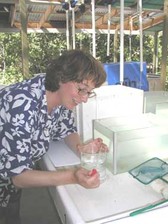Laura Nagel

Position: PhD Candidate, Queens University, Kingston, Canada (Commenced 2003)
Education:
Research Interests: I am a PhD candidate in the Biology Department at Queen's University, where my advisor is Dr. Bob Montgomerie. Dr. Lexa is my co-supervisor. My current research focuses on host-parasite coevolution in marine cleaning symbioses. For my MSc, I worked with Dr. Dolph Schluter on the evolution of mate choice in threespine sticklebacks. I have contributed to research about mating systems and demography of plants, fish, birds, crustaceans, reptiles, and mammals at field sites in North America, Latin America, and Australia.
Research Project: The Role of marine cleaning symbioses in the diversification of host fish and their parasites
Host fish are parasitised by isopod crustaceans from the family Gnathiidae. I will take three approaches to address the role of local adaptation in the diversification of hosts and parasites.
Publications:
Rundle, H., L. Nagel, J. W. Boughman and D. Schluter. 2000. Natural selection and parallel speciation in sympatric threespine sticklebacks. Science 287:306-308
Nagel, L. and D. Schluter. 1998. Body size, natural selection and speciation in sticklebacks. Evolution 52:209-18
Schluter, D. and L. Nagel. 1995. Parallel speciation by natural selection. American Naturalist 146: 292-301
Nagel, L. and Grutter, A. 2007. Host preference and specialization in Gnathia sp., a common parasitic isopod of coral reef fishes. Journal of Fish Biology 70: 497-508
Jones CM, Nagel L, Hughes GL, Cribb TH, Grutter AS (2007) Host specificity of two species of Gnathia (Isopoda) determined by DNA sequencing blood meals. International Journal for Parasitology 37: 927-935
Education:
- B.Sc. (1989) University of Toronto
- MSc. (1994) University of British Colombia
Research Interests: I am a PhD candidate in the Biology Department at Queen's University, where my advisor is Dr. Bob Montgomerie. Dr. Lexa is my co-supervisor. My current research focuses on host-parasite coevolution in marine cleaning symbioses. For my MSc, I worked with Dr. Dolph Schluter on the evolution of mate choice in threespine sticklebacks. I have contributed to research about mating systems and demography of plants, fish, birds, crustaceans, reptiles, and mammals at field sites in North America, Latin America, and Australia.
Research Project: The Role of marine cleaning symbioses in the diversification of host fish and their parasites
Host fish are parasitised by isopod crustaceans from the family Gnathiidae. I will take three approaches to address the role of local adaptation in the diversification of hosts and parasites.
- Genetic tests to determine the population structure of gnathiids
- Lab tests with gnathiids to determine the patterns and mechanisms of host preference and local adaptation
- Mate choice experiments to explore the possibility that host fish mate preferences have co-evolved with selective pressure from parasites and cleaner fish.
Publications:
Rundle, H., L. Nagel, J. W. Boughman and D. Schluter. 2000. Natural selection and parallel speciation in sympatric threespine sticklebacks. Science 287:306-308
Nagel, L. and D. Schluter. 1998. Body size, natural selection and speciation in sticklebacks. Evolution 52:209-18
Schluter, D. and L. Nagel. 1995. Parallel speciation by natural selection. American Naturalist 146: 292-301
Nagel, L. and Grutter, A. 2007. Host preference and specialization in Gnathia sp., a common parasitic isopod of coral reef fishes. Journal of Fish Biology 70: 497-508
Jones CM, Nagel L, Hughes GL, Cribb TH, Grutter AS (2007) Host specificity of two species of Gnathia (Isopoda) determined by DNA sequencing blood meals. International Journal for Parasitology 37: 927-935